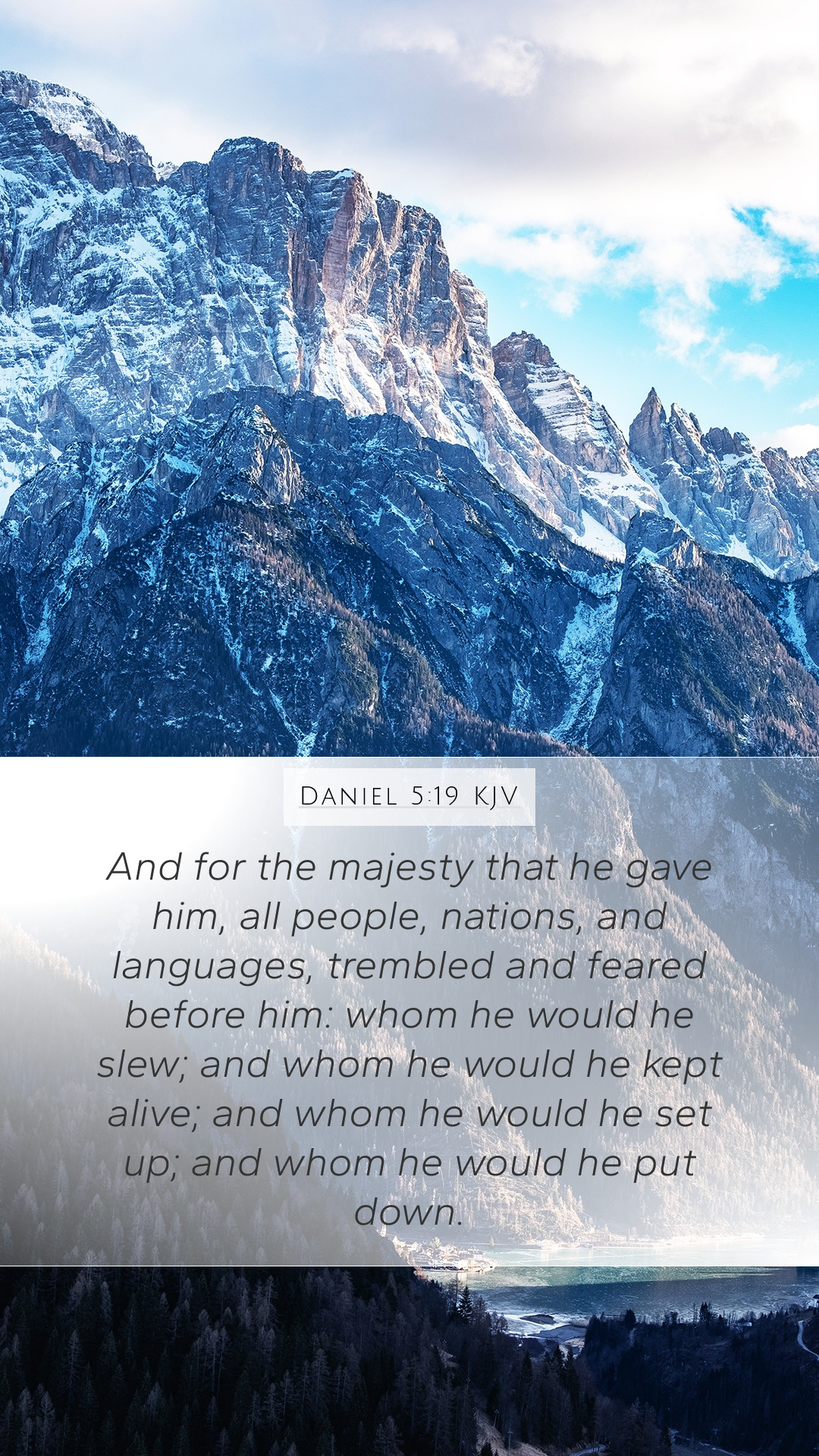Bible Verse Commentary: Daniel 5:19
Understanding the Verse: Daniel 5:19 reads, "And for the majesty that he gave him, all peoples, nations, and languages trembled and feared before him: whom he would he slew; and whom he would he kept alive; and whom he would he set up; and whom he would he put down." This verse reflects the power and authority bestowed upon King Nebuchadnezzar, illustrating the immense respect and fear he commanded among his subjects.
Insights from Public Domain Commentaries
Matthew Henry's Commentary: Matthew Henry emphasizes the sovereignty of God in the affairs of men. He notes that Nebuchadnezzar's power was not merely due to his own might but was allowed by God, who directs all powers. This establishes a biblical principle: God is ultimately in control of rulers and their authority.
Albert Barnes' Notes: Albert Barnes adds that the fear and trembling of the people were indicative of the king's oppressive rule. He stresses how Nebuchadnezzar's will was absolute, reflecting the nature of despotic power. The commentary suggests a moral lesson about the dangers of such unbridled authority and serves as a warning against pride and arrogance in leadership.
Adam Clarke's Commentary: Adam Clarke points to the consequences of Nebuchadnezzar's pride, which resulted in his eventual downfall. Clarke indicates that this verse serves to highlight how a ruler can become tyrannical when unchecked by moral or divine laws. Clarke encourages readers to reflect on the transient nature of such power and the inevitable divine judgment that follows.
Combined Analysis
The combined insights from these commentaries suggest that Daniel 5:19 is rich in meaning, emphasizing the concept of divine sovereignty over human authority. It serves as a reminder of how God orchestrates the rise and fall of leaders and the eventual accountability they will face for their actions. The intense fear that Nebuchadnezzar instilled in the people signals both his power and the moral decay that can accompany it.
Key Themes and Lessons
- Divine Sovereignty: God's control over earthly kingdoms and power structures.
- Fear and Authority: The relationship between rulers and their subjects, often marked by fear.
- Danger of Pride: The pitfalls of arrogance in leadership and the consequences that follow.
- Accountability: The reminder that all leaders must answer to God for their actions.
Application to Daily Life
This verse encourages readers to ponder their view of authority figures in their lives, whether in politics or personal settings. Believers are reminded to maintain a perspective of humility and obedience while recognizing that all authority ultimately derives from God. It also serves as a call to seek out just and righteous leaders.
Bible Cross References
- Jeremiah 27:6: Discusses God's authority in giving nations to Nebuchadnezzar.
- Daniel 4:17: Emphasizes the purpose of God in establishing rulers.
- Romans 13:1: Talks about the importance of submitting to governing authorities.
Conclusion
In conclusion, Daniel 5:19 serves as a profound reminder of the nature of human authority and the accountability that comes with it. It offers wisdom for understanding Scripture, particularly in terms of how to interpret difficult Bible passages related to governance and leadership. For those engaged in Bible study, this verse invites deep reflection on how we understand power in our world.
Further Study and Resources
Those interested in exploring the meaning of Bible verses further might consider joining Bible study groups, utilizing Bible study tools, or engaging with online Bible study resources. These materials can deepen one's Bible study insights and enhance understanding of Scripture in its historical and practical context.


